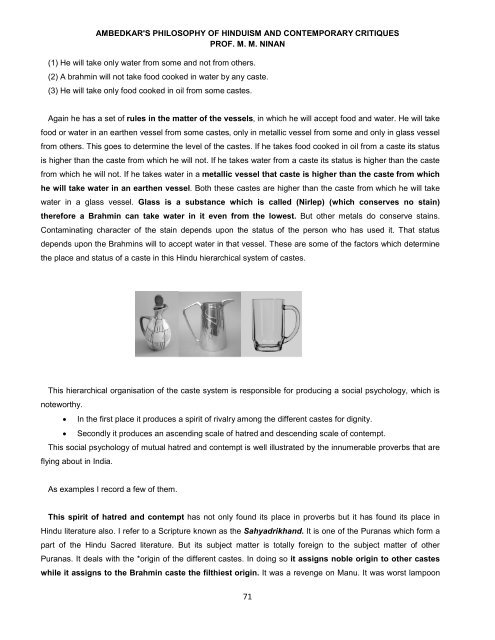Ambedkar-Philosophy of Hinduism
You also want an ePaper? Increase the reach of your titles
YUMPU automatically turns print PDFs into web optimized ePapers that Google loves.
AMBEDKAR'S PHILOSOPHY OF HINDUISM AND CONTEMPORARY CRITIQUES<br />
PROF. M. M. NINAN<br />
(1) He will take only water from some and not from others.<br />
(2) A brahmin will not take food cooked in water by any caste.<br />
(3) He will take only food cooked in oil from some castes.<br />
Again he has a set <strong>of</strong> rules in the matter <strong>of</strong> the vessels, in which he will accept food and water. He will take<br />
food or water in an earthen vessel from some castes, only in metallic vessel from some and only in glass vessel<br />
from others. This goes to determine the level <strong>of</strong> the castes. If he takes food cooked in oil from a caste its status<br />
is higher than the caste from which he will not. If he takes water from a caste its status is higher than the caste<br />
from which he will not. If he takes water in a metallic vessel that caste is higher than the caste from which<br />
he will take water in an earthen vessel. Both these castes are higher than the caste from which he will take<br />
water in a glass vessel. Glass is a substance which is called (Nirlep) (which conserves no stain)<br />
therefore a Brahmin can take water in it even from the lowest. But other metals do conserve stains.<br />
Contaminating character <strong>of</strong> the stain depends upon the status <strong>of</strong> the person who has used it. That status<br />
depends upon the Brahmins will to accept water in that vessel. These are some <strong>of</strong> the factors which determine<br />
the place and status <strong>of</strong> a caste in this Hindu hierarchical system <strong>of</strong> castes.<br />
This hierarchical organisation <strong>of</strong> the caste system is responsible for producing a social psychology, which is<br />
noteworthy.<br />
• In the first place it produces a spirit <strong>of</strong> rivalry among the different castes for dignity.<br />
• Secondly it produces an ascending scale <strong>of</strong> hatred and descending scale <strong>of</strong> contempt.<br />
This social psychology <strong>of</strong> mutual hatred and contempt is well illustrated by the innumerable proverbs that are<br />
flying about in India.<br />
As examples I record a few <strong>of</strong> them.<br />
This spirit <strong>of</strong> hatred and contempt has not only found its place in proverbs but it has found its place in<br />
Hindu literature also. I refer to a Scripture known as the Sahyadrikhand. It is one <strong>of</strong> the Puranas which form a<br />
part <strong>of</strong> the Hindu Sacred literature. But its subject matter is totally foreign to the subject matter <strong>of</strong> other<br />
Puranas. It deals with the *origin <strong>of</strong> the different castes. In doing so it assigns noble origin to other castes<br />
while it assigns to the Brahmin caste the filthiest origin. It was a revenge on Manu. It was worst lampoon<br />
71


















